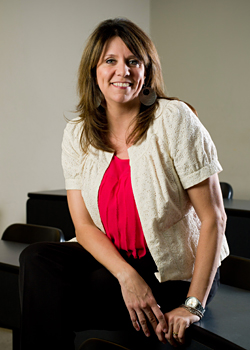Cindy Akers
2011 Texas Tech Integrated Scholar
Professor of Agricultural Communications;
Assistant Dean of Academic and Student Programs;
College of Agricultural Sciences & Natural Resources
 Any success I have, I can definitely say it's other people right beside me or ahead
of me that are helping me to get to those points. And if you find a group that pushes
you to work harder, but then you also work together to achieve a goal, then what you've
done is always better than what you can do by yourself.
Any success I have, I can definitely say it's other people right beside me or ahead
of me that are helping me to get to those points. And if you find a group that pushes
you to work harder, but then you also work together to achieve a goal, then what you've
done is always better than what you can do by yourself.- Cindy Akers
What is your research objective/interest(s)?
When I first started my tenure at Texas Tech, I was like any other new professor and tried to find money wherever I could. In my early career, much of my research was spread over many topics. Fortunately, I have narrowed my research focus into two broad areas that have afforded me the opportunity to find funding and contribute to my teaching and daily responsibilities at work. The two areas of focus are (1) effective communication with the general public and agricultural producers, and (2) recruitment, retention, and career placement.
How do you feel your research impacts the globe?
My funding sources have come from working with commodity groups (sorghum and cotton) and assisting them in finding the best way to communicate with their producers and the media. Any person involved in agriculture will tell you that to be successful you must look globally at markets and production.
Where do you get your inspiration?
Teaching and advising is the most rewarding of all occupations – there is no greater joy than teaching students how to think, and there is nothing that is more powerful in improving the quality of people's lives. Teaching and advising is where I get my inspiration.
What type(s) of service projects do you enjoy doing?
Service is an important component of my career, and I have been able to develop a record of service to my profession on a variety of levels. I am an active member of the American Association for Agricultural Education (AAAE) and the Association for Communication Excellence in Agriculture, Natural Resources, and Life and Human Sciences. Within these organizations, I have had, and currently have, professional responsibilities including serving on both journal managing editing boards. I am the secretary-elect of the Western Region AAAE.
I also have been an active stakeholder within my discipline. I am active in the FFA organization both nationally and on the state level. I just finished my term as superintendent of the National FFA Agricultural Communications Career Development event. Another program I was active in with the National FFA was the Omega program. In that program, I was a mentor for five early-career professionals in our discipline. This is probably the most meaningful service opportunity I have had in my career.
What are you currently working on?
I currently have taken an administrative role. Starting Sept. 1, 2011, I will be the assistant dean of academic and student programs for the College of Agricultural Sciences and Natural Resources. I am excited to have the opportunity to work with students and faculty within the entire college, not just in my discipline. I am excited about this new opportunity in my career.
What advice do you have for new faculty members on balancing the components of an integrated scholar into their careers (academics, research, and service)?
I have had the opportunity to serve as a faculty mentor on both the departmental and national levels. I think it is important to advise new faculty members early in their career to look for research and funding opportunities that complement their teaching efforts. I also advise faculty to look at opportunities to publish research in the scholarship of teaching and learning. All faculty are required to work in all three areas, and any time you can blend the three areas, it helps. I also recommend you find a person in your academic area, as well as someone outside your area, to serve as a mentor. These people need to be honest and frank with you on evaluating your progress. I was fortunate to have outstanding mentors when I was a young faculty member that pushed me to be better in the areas I did not enjoy.
Scholar Background
I am a fourth-generation agriculturist and knew that I would not be able to go back and work in production agriculture. That is how I found the discipline of agricultural communications. I loved the idea of promoting the field that I love. I worked in the industry for four years before returning to receive my doctoral degree. I am so fortunate to have a job that I love. I get the opportunity to conduct research to help promote the field I love.
I grew up in Estancia, New Mexico. My parents and two brothers are still in Estancia raising cattle.
B.S., Texas Tech University, Agricultural Communications, 1991;
M.S., Texas Tech University, Agricultural Education, 1992;
Ed.D., Texas Tech University, Curriculum and Instruction with an emphasis in Agricultural
Education, 2000.
Office of the Provost
-
Address
104 Administration Building, Box 42019, Lubbock, Texas 79409-2019 -
Phone
806.742.2184 -
Email
provost.communications@ttu.edu
